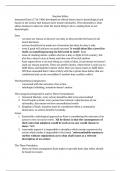Summary
Summary Kantian Ethics Notes
- Module
- G582 - A2 Religious Ethics
- Institution
- OCR
Notes on Kantian Ethics in accordance with the OCR Religious Studies specification. The notes provide information, scholars, ideas and quotes compiled from various resources from both within and outside of the curriculum.
[Show more]



